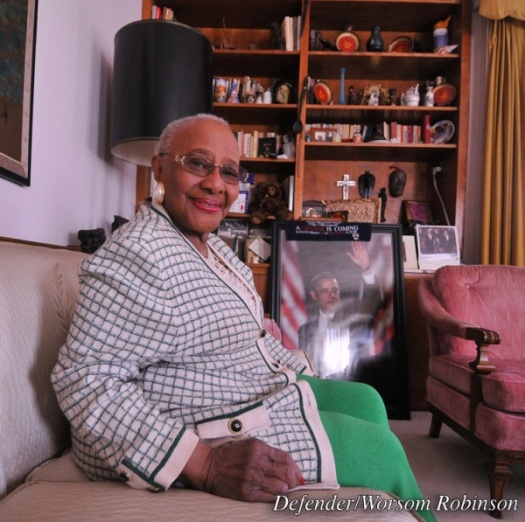
Small in stature, the Rev. Willie T. Barrow has a huge heart and “welding” spirit.
Born in Burton, Tex., Barrow is a welder by profession who turned activist in the 1940s when she led a demonstration against a segregated school system that re
Small in stature, the Rev. Willie T. Barrow has a huge heart and “welding” spirit. Born in Burton, Tex., Barrow is a welder by profession who turned activist in the 1940s when she led a demonstration against a segregated school system that refused to bus Black children to school. In 1947, her activism and low job prospects led her and her late husband to Chicago. “We both were welders but he couldn’t find a job where we were. We came to Chicago and he found a job. Soon, I began working too,” the now-85-year-old told the Defender. She then began to minister in the city and throughout the suburbs during the Civil Rights Movement. “I was the International Youth Director for the Langley Avenue Association. That’s how I got my (ministry) start. It was during a time when women pastors weren’t favored, but I didn’t stop. I was called on by God, not by a bunch of men. That’s who I’m going to obey. I’m doing what God has called on me to do,” said Barrow. Barrow said her work caught the eye of many leaders during that era, including the Rev. Martin Luther King Jr. and his wife Coretta Scott King, Andrew Young, John Porter, the Revs. Billy Kyles and Otis Moss Jr. They all became friends and volunteers during the struggle for voting rights, educational equality, housing inequality and the right to eat in restaurants, among other issues, said Barrow, nicknamed “the little warrior.” She was then asked to volunteer once a month as a field organizer for King in Atlanta. She was responsible for organizing meetings, rallies, shelter and transportation for the demonstrators who came to participate in the marches and sit-ins during the Civil Rights Movement. Barrow and a large group of women she gathered often traveled on the train to southern states, including Alabama. It wasn’t an easy ride, nor was there lodging. It was during a time when Blacks were still labeled “Colored” and “Negroes,” and the women weren’t respected or recognized to lead ministries. “We paid a price, honey. While we were on the train, we had to lie on the floor because we couldn’t be seen. We were going through places where the Ku Klux Klan were and they were always on the lookout,” Barrow said. When they reached their destination, hotel stays were out of the question. Instead, they had to secretly stay in houses, and again, spend a great deal of time lying on the floor so they wouldn’t be seen. The reverend participated in the demonstration in Selma, Ala. and the March on Washington, and often took her only child, the late Keith Barrow, with her. In 1955, she met the Rev. Jesse Jackson and helped start Operation Breadbasket, now named the Rainbow/PUSH Coalition. She currently serves as the chairperson emeritus of the organization. While she was with Operation Breadbasket, she continued in the fight for freedom in Chicago. “I was with Dr. King each time he came to Chicago for the movement. Each week we marched for open housing. Many pastors didn’t want to open their church to him because they were fearful. But, the Rev. Clay Evans was one pastor who wasn’t afraid to stand on the frontlines with us,” said Barrow, an associate pastor at the Vernon Park Church of God. Now, Barrow, who was recently named a Chicago Freedom Sister as part of an exhibit featured at the DuSable Museum of African American History, spends a great deal of her time with Rainbow/PUSH and making sure the younger generations hear her message about taking advantage of the rights she and others fought for. “In one sense things have gotten better, but we all know it will get worse before it gets better. We have to do more to engage your young people,” said Barrow, who proudly boasts of being the godmother to 108, including President Barack Obama and Chicago-born singer/actress Jennifer Hudson. Barrow said it’s important to train those in the younger generation who have a commitment for change. One of her “training partners” is a South Side pastor who she refers to as her “other husband,” Rev. Michael Pfleger of St. Sabina Catholic Church. “Oh, he is serious. He’s for real. He loves the youth and will forever do what he can to help. Whenever I come to his church, he’ll call out to me and let people know I’m his wife,” she said with laughter. While Barrow no longer welds steel, she now “welds souls.” “My ministry is beyond the walls. I’m a little warrior and I love to fight for justice. Where there’s injustice, you’ll find the Rev. Barrow,” she said. In 1997, a street on Chicago’s South Side – 76th Street from Stony Island Avenue to Jeffrey Boulevard – was named in her honor. And her church has plans to erect a building in south suburban Lynwood to house the Willie Taplin Barrow Museum of Civil Rights.